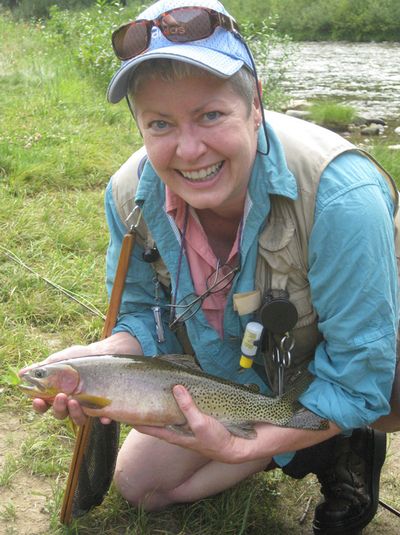Book Notes: Barnes’ latest an adventure set in Saudi Arabia

Kim Barnes, the University of Idaho English professor who has just published her third novel, will be in Spokane this week to read from her new book.
“In the Kingdom of Men” tells the story of Gin Mitchell McPhee, a poor Oklahoma girl who marries the local basketball star and heads off to a new life in an oil company compound in Saudi Arabia. When a young Bedouin women is found dead, Gin’s life begins to unravel.
In advance of the reading at 7 p.m. Wednesday at Auntie’s Bookstore, 402 W. Main Ave., Barnes took time to answer five questions about her book, her inspiration and her process.
Q. Where did the character of Gin come from?
A. The voice of Gin McPhee, who narrates the book, came to me about five years ago. I had been talking with my aunt and uncle about their time in Arabia in the 1960s and asked them if it would have been possible for an American man to have a love affair with an Arabian woman. They told me that it had been known to happen, and that when it was discovered, the American man would be “hospitalized” under armed guard inside the American compound until he could safely be flown out and back to the States. I had this immediate sense of the drama that might surround such an event. As I was talking with them, the opening lines of the book came to me: “Here is the first thing you need to know about me: I’m a barefoot girl from red-dirt Oklahoma, and all the marble floors in the world will never change that. Here is the second thing: that young woman they pulled from the Arabian shore, her hair tangled with mangrove – my husband didn’t kill her, not the way they say he did.” I had no idea where the story would go from there, but I knew I had my narrator, and that if I followed her, she would lead me where I needed to go. That narrator, I soon discovered, was a young woman named Gin McPhee.
Q. You are very much a daughter of the American West. How did you end up setting a story in Saudi Arabia?
A. Unlike my aunt and uncle, who moved to Arabia to make a new life for themselves in the oilfields, my parents left Oklahoma and moved to northern Idaho, where my father worked as a gyppo (from “gypsy”) logger. I was raised in the small towns and logging camps along the North Fork of the Clearwater River, and one thing that became very clear to me as I did my research was just how nomadic my family was as we moved from one logging site to another. The isolated American compounds and Bedouin encampments in the Kingdom weren’t so different from the isolated encampments in which I lived – each its own kind of wilderness. Another parallel aspect of the setting that drew me was that I was raised in the Pilgrim Holiness sect of Pentecostal fundamentalism, and I was intrigued by the similarities I found in the religious dictates governing women in Arabia. What I discovered, too, is how similar the American development of the Arabian “frontier” was to the settling of the West: another destiny manifesting itself. Finally, it was all strangely and surprisingly familiar to me.
Q. Did the process of writing “In the Kingdom of Men” differ much from how you wrote your other novels?
A. Very much so. Of the five years it took me to write the novel, I would guess that four were spent doing research. There was also the challenge of writing a story from Gin’s point of view – a woman residing inside a closed house, inside a closed compound, inside a closed culture, inside a closed country. What stymied me most was how much couldn’t happen because of Gin’s inability to move outside of the gated and guarded camp without her husband or close male relative. She can’t walk out those gates, she can’t drive the roads, she can’t leave the compound or the country without her husband’s permission. What I felt as I wrote the book was what Gin feels: a claustrophobic sense of mounting frustration.
Q. What do you hope people take away from the book?
A. I hope that my readers come away from the book with a lingering emotional investment in Gin’s story and that, through Gin, they learn something about themselves. I hope, too, that the setting and the situation of the story might lead to a more open and informed conversation about the complex relationship between the U.S. and Saudi Arabia and related issues of gender, race, politics, and power that continue to inform our world today.
Q. What are you reading now?
A. Two books by sister Idahoans: Marilynne Robinson’s memoir, “When I Was a Child I Read Books”; and a wonderfully promising novel manuscript, “Water in a Dry Land,” by my former student and fellow logging town survivor, Annie Lampman.